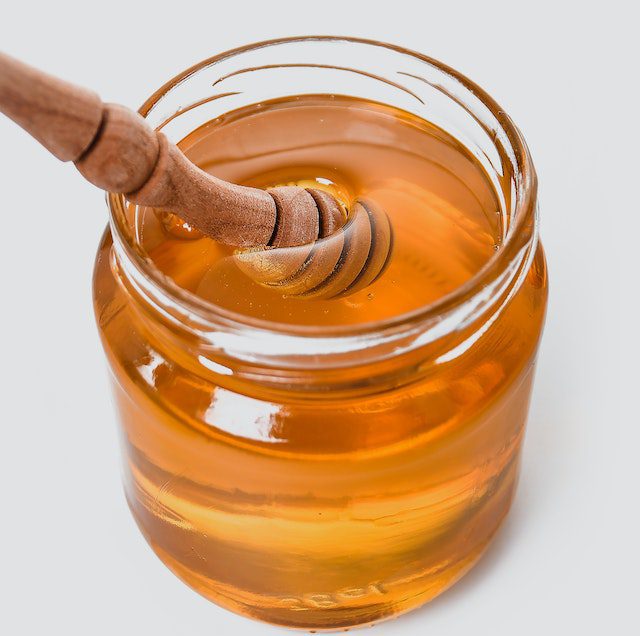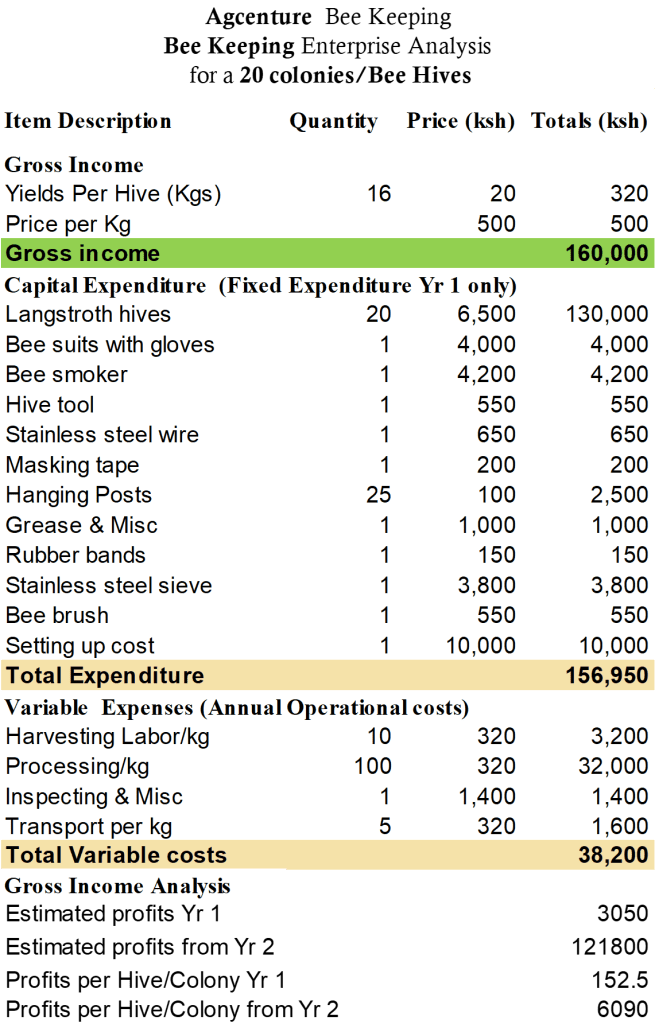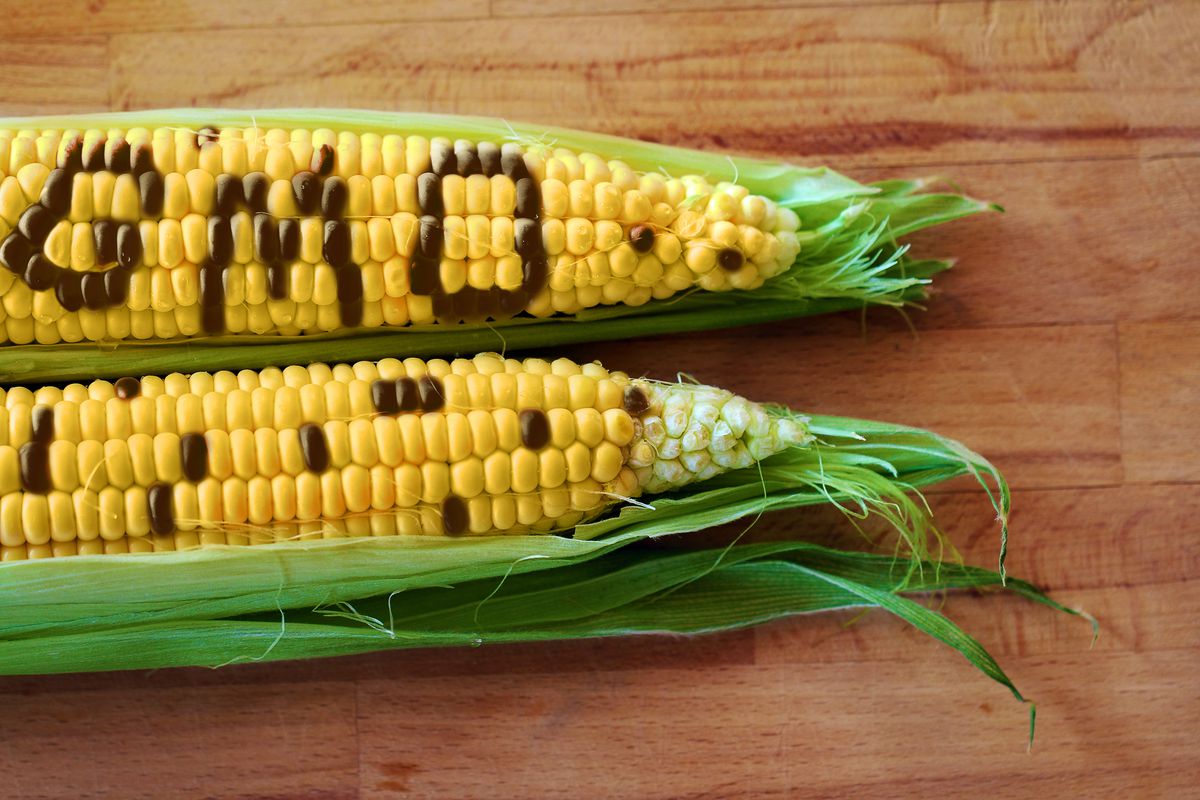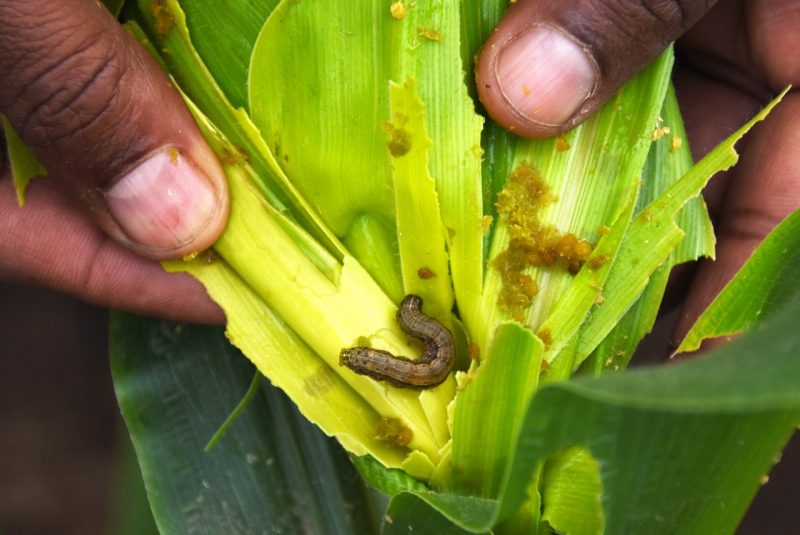How much money can you make in commercial keeping of honeybees? In this post, we will explore the income and costs of commercial beekeeping in Kenya. It is one of the best business opportunities for farmers and herders in the arid and semi-arid areas (ASAL) of Kenya such as Kitui, Baringo & Samburu counties.
Beekeeping involves the managing of bees to obtain their honey, beeswax, and other bee products for food, medicine, and income generation. It’s easier to manage than livestock and crop farming for the following reasons.
- Which are the best bee products in Kenya?
- Is commercial beekeeping in Kenya Profitable?
- Gross Margin Analysis for Commercial Beekeeping in Kenya
- How can you make more profits as a beekeeper?
- Best business opportunities in beekeeping in Kenya?
Benefits of beekeeping in Kenya
Is honey farming a profitable agribusiness idea for you? The following are the benefits or reasons that make beekeeping better than any other farming investment idea.
- Bees produce a variety of very profitable products such as honey, beeswax, and propolis (used in medicines) and other products such as royal jelly, pollen, bee venom, and bee brood.
- Beekeeping is easy making it one of the best investment ideas for individuals, women’s groups, youth groups, men’s groups, church groups, etc.
- You can make a lot of money as a beekeeper without having to own land.
- Beekeeping requires little space and complements other farm activities by helping the pollination of flowers, plants, and crops. Besides, the bees do not compete with livestock for food.
- Beekeeping does not need good soils or water making it the best farming idea in arid areas which consist of over 80% of all land mass in Kenya
- Bees will help to increase the quantity and quality of flowering crops (coffee, papaw, banana, avocado, macadamia, mangoes, etc.)
Read Next; Which are types of Bees in Kenya?
Which are the best bee products in Kenya?
Honey, beeswax, and propolis are the three major products of beekeeping in Kenya. Other worthy exploiting for more cash are royal jelly, pollen, bee venom, and bee brood. This post will focus on the three major products
Honey

Which is the best type of honey to buy in Kenya? Honey is the key product of beekeeping. Honey mostly contains sugars (80-85%) that are easily absorbed by the body. Honey is made from nectar which is a sugary secretion of flowers.
It has a high market value, is very profitable, and has a high growing demand in the local and export markets. Its demand stems from its many traditional and medicinal uses. The commonly used of honey in Kenya are;
- As a natural sweetener in place of refined sugar for food (cake, chapatti, bread, etc.) and drinks (try some in your tea!).
- Medicine to treat coughs, ulcers, wounds, and sore throats.
- Traditional food preservative
- Energy food for young, old, and sick people
- Making local beer
To earn the highest profits in beekeeping in Kenya, extract it and sell refined pure honey in well-packaged plastic and glass jars. There are 5 types of honey available in Kenyan markets.
- Crude honey- A mix of ripe and unripe honey mixed with wax, honeycomb bees, and brood comb. Usually used to brew local beer. It has a very high demand in Kenya.
- Semi-refined honey- The liquid honey that remains after the wax is skimmed off. I may contain some impurities such as wax remains and bee’s legs. It’s mostly consumed at home or sold for further refining.
- Refined honey- Marketed as refined pure honey. It is strained to remove any impurities. It’s marketed without adding any other product.
- Chunk honey is pure honey that has some comb pieces or chunks added into the jars. It is done to give consumers some confidence that it is natural honey. Because of this reason, chunk honey may fetch higher prices than refined honey.
- Comb honey – Also known as capped honey. It’s honeycombs in white cappings. Beekeepers cut these caps, add them in small trays, and cover them with cling films. It’s the most premium quality honey in Kenya. Its price per gram has a huge niche market in Nairobi’s affluent estates.
Beeswax
Beeswax is one of the byproducts of beekeeping. It’s the substances that bees use to make their honeycombs.
Though it is not highly used in Kenya, It is a valuable raw material in cosmetics, soaps, and wood preservation. Besides you can learn to make candles, batiks, and shoe polish for sale with additional training.
Propolis
Propolis is the black sticky plant resin, that the bees collect. They use it as a glue or sealer to cover the insides of the hives or fill in any cracks. The substance is antibiotic and you can use it as medicine. Some people also chew it as chewing gum for the throat and chest. Some beekeepers process it into propolis ointment and capsules for sale. Propolis has a huge export market.
Is commercial beekeeping in Kenya Profitable?

Is beekeeping in Kenya profitable? The simple answer is yes. But it will depend on how well you manage your apiary. In this post, we will give you a simplified cost and benefits analysis for starting and running a commercial beekeeping enterprise. We will compute all the income for selling bee products minus capital and operational costs.
Bee Keeping enterprise analysis assumptions
To give you the gross margin analysis of beekeeping in Kenya we will assume the following assumptions.
You are running a bee farm with 20 colonies using the modern Kenya Top Bar Hives (KTBH) or the Langstroth hives. We will assume a conventional yield per beehive of 20kg of honey per colony. For more realistic figures we will assume that you can achieve an 80% despite the climate change risks. Finally, we assume that you can harvest and sell all semi-refined honey in bulk at a price of Ksh500K per kg.
The Real Incomes for beekeeping in Kenya
To estimate incomes from your beekeeping, we will multiply the harvests and market prices.
The total harvests of raw honey from your 20 hives is 320 kgs assuming an 80% production level in a year. (80%*20beehives*20kg/beehive)
Your income from selling honey will be Ksh 16000 by selling all your honey at Ksh 500 per kg.
How to start a beekeeping business in Kenya?
What are the costs of starting a commercial beekeeping business in Kenya? You will need Ksh 146,950 to start a 20 colonies or beehives venture. This is your one-time capital expenditure in year one only to set up your apiary. The other costs are some labor costs required to set up your structures. In the section below, we give you the required tools and equipment to start a beekeeping farm.
What are the operating costs of beekeeping in Kenya?
Once you set up your bee farm, your variable expenses from year 2 will go down considerably. In our estimates, you can spend a total of around Ksh 38,200.
These are incurred in inspecting the beehives, harvesting, value addition, and possibly transport. That would be once or twice a month so the expense would be manageable.
Gross Margin Analysis for Commercial Beekeeping in Kenya
How much profit can you make from beekeeping in Kenya? In our conclusion, we determine this as follows from our apiary. We will use the simplified enterprise analysis of deduction expenses from sales income
(Net income= sales revenue-total costs)
Net Income year one = Ksh160,00- Ksh156 950 = Ksh 3050
Net income from year 2 onwards= Ksh 160,000- Ksh 38200 = Ksh 121,800
How can you make more profits as a beekeeper?
To make more money as a beekeeper in Kenya, you can consider 3 top ideas, diversification, value addition, and reputation.
- Diversification-Venture into harvesting and selling other bee products at the following prevailing market prices.
| Bee product | Minimum Price (Ksh/kg) |
|---|---|
| Raw Honey | 500 |
| Wax | 700 |
| Propolis | 800 |
| Pollen | 5000 |
| Pollination Services | 5000* |
Pollination services is an innovative beekeeping idea. You will operate a business where you can lease your beehives for 21 days to fruit farmers for pollination. A simple internet research indicates you can make up to Ksh 5000 for this service.
- Value addition of crude honey into pure refined honey and package it into quality plastic and glass jars. Then, label them indicating net weight, name, and address of the producer’s country of origin, and the words such as pure honey.
- Reputation- build up a name for supplying honey in the right quality, in the right quantity at the right price on time. You can also buy honey from other bee farmers and market it alongside yours to satisfy all orders.
- Start small- Instead of borrowing loans to start a huge apiary as in this post, start small using traditional bee hives and equipment. But have a business plan on how to expand and shift operations from production only to honey refining, packaging, and labeling.
Which beekeeping equipment and tools do you need?
The following is a list of the equipment and tools you will need to start and run a commercial beekeeping business in Kenya.
- Beehives – for housing bees. A hive is the most important piece of beekeeping equipment. For ample production invest in a modern bee hive like the Kenya Top Bar Hives (KTBH) or the Langstroth Hives. A modern one goes for around Ksh 6500
- Bee-suit – A beekeeper is a personal protective suit to protect you from bee stinging and gives you comfort as you work under heat or cold weather. A complete suit consists of the following items: Veil: for covering the
- head and face and giving protection from stings.Overall: for covering the rest of the body Gloves: for covering the hands Gumboots for covering the feet.
- Elastic bands to seal your ankles and wrists from the bees
- Smoker – the bee smoker is used to control the bees and keep them from becoming aggressive when they are handled.
- Catcher box- For transferring bees from one place to another – it’s a miniature hive.
- Hive tool- For lifting top bars. The hive tool can be improvised by using a strong knife.
- Bee brush- For brushing bees from combs when harvesting honey or at any other time you need to remove bees. You can improvise by using a feather.
- Other items for if you wish to diversify your beekeeping business are Bee pollen collector, queen excluder, propolis trap, etc.
Where do you buy quality bee-keeping equipment in Kenya? There are many suppliers of quality beehives and other equipment for you. Lucky for you, you can enjoy convenience by ordering them online from Jumia on the button below. They do home deliveries and sell items as a package saving you some money.
Best business opportunities in beekeeping in Kenya?
Beekeeping in Kenya remains underexploited and threatened by various risks such as droughts, pests, and little or no access to modern harvesting and processing. As a willing investor, you can make money in beekeeping by not farming the insects but offering products and services. We have summarized the best opportunities below.
Beekeeping Equipment supplier
Maker, broker, or distributor for following products with indicative retail prices in Ksh.
- 𝐋𝐚𝐧𝐠𝐬𝐭𝐫𝐨𝐭𝐡 beehives …. @ 3,850/-
- 𝐁𝐞𝐞 𝐜𝐚𝐭𝐜𝐡𝐞𝐫 𝐛𝐨𝐱𝐞𝐬 …. @ 2,𝟎𝟎𝟎/-
- 𝐁𝐞𝐞 𝐬𝐮𝐢𝐭𝐬 …. @ 𝟑,𝟓𝟎𝟎/- & 4,500/-
- 𝐒𝐦𝐨𝐤𝐞𝐫𝐬 …. @ 𝟐,𝟎𝟎𝟎/-
- 𝐇𝐢𝐯𝐞 𝐭𝐨𝐨𝐥𝐬 …. @ 650/-
- 𝐁𝐞𝐞 𝐛𝐫𝐮𝐬𝐡 …. @ 550
Beekeeping Services provider
Become a reputable consultant offering consulting services on apiculture management in your area. Some of the services you can offer are
- 𝐁𝐚𝐬𝐢𝐜 𝐛𝐞𝐞 𝐤𝐞𝐞𝐩𝐢𝐧𝐠 𝐭𝐫𝐚𝐢𝐧𝐢𝐧𝐠
- 𝐁𝐞𝐞 𝐡𝐢𝐯𝐞𝐬 𝐢𝐧𝐬𝐭𝐚𝐥𝐥𝐚𝐭𝐢𝐨𝐧
- 𝐇𝐨𝐧𝐞𝐲 𝐡𝐚𝐫𝐯𝐞𝐬𝐭𝐢𝐧𝐠
- Apiary Site selection
- 𝐁𝐞𝐞 𝐡𝐢𝐯𝐞𝐬 𝐢𝐧𝐬𝐩𝐞𝐜𝐭𝐢𝐨𝐧
- 𝐁𝐞𝐞𝐬 𝐫𝐞𝐦𝐨𝐯𝐚𝐥/ 𝐜𝐨𝐥𝐨𝐧𝐲 𝐬𝐡𝐢𝐟𝐭𝐢𝐧𝐠





Thank you for giving us the best information ever. I have been struggling in keeping livestock like cows, goats and chickens, but now alongside I will keep bees as well.
I am sourcing for money to start the project as soon as possible.